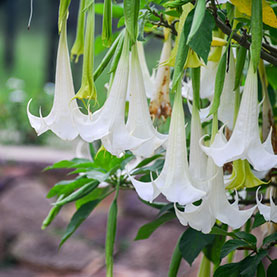
Hardy Plants to Survive the Winter
Feb 19th 2018
Winters in Florida are considered mild, but because the Sunshine State is home to many tropical plants accustomed to live in warm, humid weather for most of the year, even relatively mild winters could bring significant stress. Luckily, knowing which species to plant and following basic Gainesville lawn care practices can put your yard at an advantage. Here are some tropical plants hardy enough to survive and even thrive at the peak of Gainesville winters.
Chinese Windmill Palm
Palm trees may seem like an obvious choice in Florida, and there is a reason for it. They have an undeniably tropical look, yet they hold their own during the coldest months of the year with little maintenance. Specifically, Chinese windmill palms are hardy down to USDA zone 6b and can resist temperatures as low as -4 degrees Fahrenheit. They grow slowly, which makes them appropriate for smaller yards. For best results, plant them in well-drained areas, preferably with protection from strong winds.
Elephant’s Ear
These tall, tropical-looking plants can add drama and bold texture to your yard with their giant leaves that can grow to be about 2 feet wide and 3 feet long. They can be hardy down to USDA zone 7, but they do especially well between zones 9 and 11. Most can handle temperatures down to 30 degrees Fahrenheit, although they may go dormant with a frost. These plants prefer filtered sun or shade and soil that is nutrient-rich and moist but well-drained. For winter protection, cover their bases with 12 inches of mulch.
Angel’s Trumpet
Make a colorful statement with these trumpet-shaped flowers that can bloom in a variety of colors, including yellow, orange, peach, white, pink and purple. These flowering shrubs can grow quickly, especially during summer, and reach heights of about 10 feet. Although they prefer damp, rich soil and full sun, they tolerate partial shade and can perform well down to zone 7. During the growing season, feed them with fertilizer every two weeks. Use gloves while handling them and prevent children and animals from eating them, for they are highly toxic.
Hardy Sugar Cane
This one blooms in the fall, just in time to be the center of attention in your garden all winter with its pink and silver flower panicles. It grows quickly and can reach heights of 10 to 15 feet. Hardy down to zone 6, it prefers partial sun exposure and well-drained but moist soil.
Japanese Fiber Banana
Bananas are classic components of the tropical look. Although this type does not produce edible bananas, it is the hardiest of its kind. Treated strictly as ornamental, this plant adds drama to winter yards with its large, light green leaves. It can grow up to 8 to 10 feet in one season and perform well down to zone 6. With proper mulching and lawn care in Gainesville, FL, it can survive freezing temperatures.
Hardy Hibiscus
Hibiscus is known for its pretty flowers that can reach the size of dinner plates. These plants thrive under full sun and in acid, well-drained soil amended with organic matter. Though they are hardy down to zone 5, they grow faster and larger during the warmer months. Applying a layer of mulch can help hibiscus stay warm in the winter and early spring.
Canna
For a colorful landscape Gainesville, FL, friends and neighbors will admire, consider planting some canna flowers. They can be white, red, orange, yellow, pink or bicolored. The foliage ranges from solid greens to combinations with hot colors such as yellow, orange and red. Canna typically blooms in the summer and fall and is hardy down to zone 3. For added protection, mulch heavily around it during the colder months.
Lawn Care in Gainesville, FL
For almost 10 years, Evergreen Lawn Care has been providing high-quality landscaping Gainesville, FL, residents can rely on to maintain beautiful backyards throughout every season. Our services include lawn maintenance, mulching, irrigation repairs, pressure washing, pruning and more. If you have questions about the hardiness and maintenance requirements of the plants you wish to have at home, we can answer them and give recommendations. Contact us for more tips on how to care for your garden this winter.
